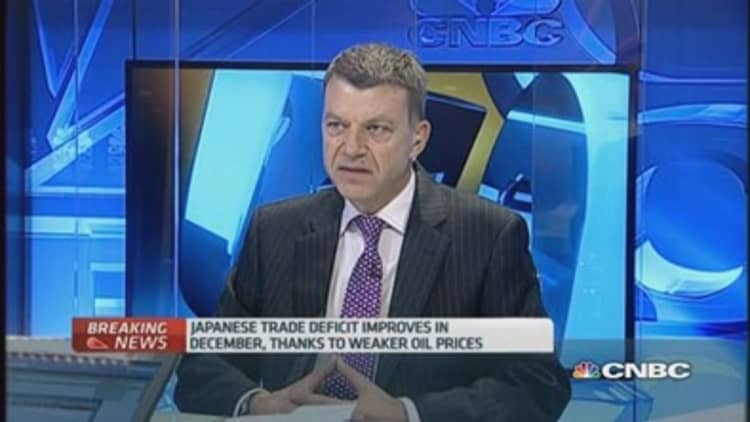Tokyo's financial analysts are on the front lines of Prime Minister Shinzo Abe's effort to reform Japan's rigid labor market with a "white collar exemption" law set to abolish overtime pay for specialists earning over $90,000 dollars.
"The thinking is that progress in reforming the labor market—one of the areas in which overseas investors are looking for the government to take action—would make them more enthusiastic about investing in the country," Mizuho Securities chief market economist Yasunari Ueno said in a note.
Government officials and business leaders believe this revision will send investors the message that the regulatory bedrock has been smashed, according to an Asahi newspaper report cited in Ueno's report.
Third arrow
Reforming Japan's labor laws is crucial to the "third arrow" of Abenomics, Abe's nearly two-year old effort to kick start Japan's economy. After the first two arrows of monetary easing and fiscal stimulus, the government pledged to push ahead with labor market deregulation, albeit targeting a small number of high wage earners.

The new exemption will apply to workers in "specialist roles" earning 10.75 million yen ($90,889) or more, according to a draft published on January 16 by the Ministry of Health, Labor and Welfare (MHLW). "Specialists" will include analysts, consultants, currency dealers, research and development personnel, financial product originators, and others, according to Ueno.
The average salary for a financial analyst in Tokyo is between 7.5-10 million yen ($63,454-$84,605), according to the 2015 Robert Walters Salary Survey. That's well above the average Japanese worker's annual income of $36,039, according to Organization of Economic Co-operation and Development figures.
Senior financial analysts are paid around a fifth more. But managers leave the labor union as they move up the ranks and are no longer eligible for overtime pay, according to Mizuho's Ueno.
Trojan horse or show piece?
"It's a Trojan Horse exemption that will be expanded over time to lower income workers," said Tokyo Managers' Union (TMU) committee chairman Takashi Suzuki.
Japan Inc says goodbye to going bust in 2014
He tipped the expansion of deregulation on temporary employee contract laws for specific jobs in 1996 to manufacturing jobs generally by 2004 as a historical example. This enabled employers to obtain cheaper labor; temporary workers are paid less than permanent workers in Japan.
It's unclear if the revisions are even legal, he added. Promoting employees to mangers in title to avoid paying overtime was effectively ruled illegal after a court ordered McDonald's Japan to pay a store manager overtime wages in January 2008, he pointed out.
In fact, the framework of assessing the performance of "highly specialized" workers by results, rather than number of hours worked, already exists under current labor law and is pointless, the Labor Lawyers Association of Japan (LLAJ) pointed out in a statement released on January 23.
The real issue, according to the (LLAJ), is that the government and employers will seek to expand the category of workers who will not be eligible to be paid for overtime without bothering to change the law.
The LLAJ is "strongly opposing" the proposal because it will "only encourage longer working hours and seek to legalize overtime without pay".
Reform killer?
That kind of resistance could stall further reforms.
"It is entirely feasible that reform momentum in the labor market will slow sharply as soon as this message about the symbolic smashing of the regulatory bedrock has been delivered to overseas market participants," Mizuho's Ueno said.
The government does not currently plan to expand the law or lower the income threshold, according to the MHLW official. But the Prime Minister has been vague; asked in parliament last June whether the no-overtime pay threshold could be lowered in the future Abe said he "didn't know," according to the LLAJ statement.


